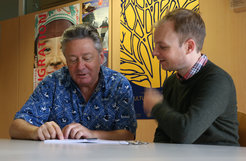“A Turning Point in the Study of Cultural Evolution”
The Max Planck Institute for the Science of Human History welcomes 300 participants from around the globe to Jena to introduce a unique forum for evolutionary research: the Cultural Evolution Society. The Society’s inaugural conference takes place from September 13th to 15th and is organized by the Department of Linguistic and Cultural Evolution at the Max Planck Institute.
Shortly after the foundation of the Cultural Evolution Society, the fledgling field of evolutionary science is celebrating a bold coming-of-age: 300 scientists from 40 different countries including China, India, Japan, New Zealand, Russia, and USA, and representing disciplines as diverse as anthropology, archaeology, biology, computer science, linguistics, psychology, religious studies, and others, have registered for the Cultural Evolution Society’s Inaugural Conference held in Jena this week. Hosted by the Max Planck Institute for the Science of Human History, the Conference will offer an unprecedented framework for evolutionists to discuss – and debate – big questions of human and animal cultural evolution. By choosing Jena as the venue for its first meeting, the Cultural Evolution Society is not only paying tribute to the city’s long and well-known tradition in evolutionary research, but is also recognizing the pioneering role of the young Max Planck Institute for the Science of Human History as an emerging world-leader in evolutionary science.

“The response to our call for papers was unexpected and overwhelming”, says Dr. Olivier Morin, director of the Minds and Traditions research group at the Max Planck Institute for the Science of Human History in Jena and main organizer of the Cultural Evolution Society’s Inaugural Conference. With over 300 applications for participation coming from around the globe and from a huge range of disciplines, Morin’s team is working at the edge of its capacities to organize the first meeting of the recently founded Cultural Evolution Society. “This massive reaction from scientists from so many different disciplines and countries proves the long-felt need for a more inclusive and innovation-driven paradigm to study questions about culture, language, cognition, and social organization.”
The Cultural Evolution Society’s Inaugural Conference is an attempt to bring scientists together who share the view that the concept of “evolution” should not be limited to just the natural sciences. “Cultural evolution is the perfect framework for understanding phenomena such as language change and major transitions in human social organization”, says Russell Gray, Director of the Department of Linguistic and Cultural Evolution at the Max Planck Institute for the Science of Human History. “Integrating inferences from different disciplines is a key feature of our institute. I am delighted that the Conference will establish a truly interdisciplinary framework to address questions ranging from whether animals have culture, to what drives language change, or why beliefs in powerful gods are so prevalent”, says Gray.
Scientific discussion across disciplines, particularly when crossing the traditional gap between the natural sciences and the humanities, is prone to be highly controversial – and so are the methods used by the members of the Cultural Evolution Society. “Large databases, computational modeling, and phylogenetic methods are not the tools typically used by humanities scholars. I expect that we will have lively discussions about some of our approaches and findings”, says Gray.
Morin and Gray are certain that this is only the beginning of a real turning point in social and cognitive sciences. “We are sure that the foundation of the Cultural Evolution Society and this Inaugural Meeting in Jena will mark the coming-of-age of a new field that will spark many more meetings, collaborations, research projects, publications, and journals,” they say. “We are thrilled to see this happen right here in Jena – not least because Jena used to be a very famous center for evolutionary sciences in the past, and with this will become a cradle of cultural evolution sciences in the present.”
